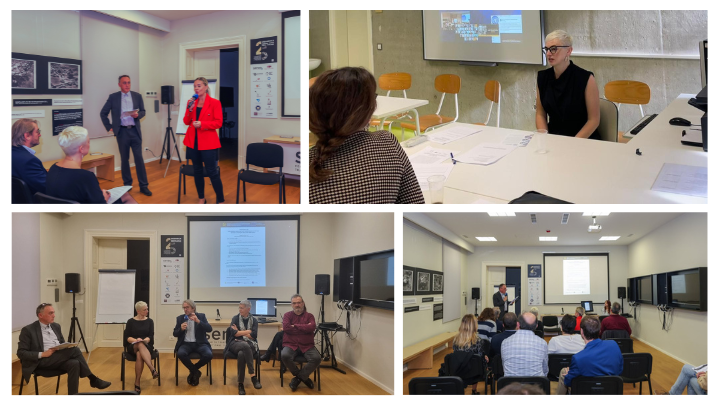Mechanism Information Programme Launches Guide for History Teachers in Croatia

On 20 October 2023, the Mechanism Information Programme for Affected Communities (MIP) launched its Guide for History Teachers: How to Use Archival Material of the ICTY and Mechanism in Teaching the History of the 1990s Conflicts (Guide) in Pula, Croatia, as part of a three-day event held from 20 -22 October celebrating the 20th anniversary of the Croatian Association of History Teachers (HUNP).
The Guide, developed in collaboration with the European Association of History Teachers (EuroClio) and representatives of teachers’ associations from across the former Yugoslavia, is designed to assist history teachers in effectively incorporating archival material from the International Criminal Tribunal for the former Yugoslavia (ICTY) and the International Residual Mechanism for Criminal Tribunals (Mechanism) into their lessons on the 1990s conflicts in the region.
The launch event was held at the premises of the Sense Transitional Justice Centre and opened by the Deputy Mayor of Pula, Ms. Ivona Močenić. In her remarks, Deputy Mayor Močenić emphasised the importance of educating young people about the events that occurred during the 1990s conflicts in the former Yugoslavia. Ms. Joke van der Leeuw-Roord, founder and special advisor of EuroClio, also spoke during the opening session, underscoring the ongoing challenges associated with teaching students about the conflicts and expressing EuroClio's satisfaction with its role in supporting the Guide.
Two panel discussions followed the opening session. MIP’s youth outreach coordinator, Ms. Anisa Sućeska, led the first panel, outlining the MIP’s training initiatives for more than 600 teachers across the former Yugoslavia on how to effectively use ICTY and Mechanism archives when creating educational materials. She stressed the importance of these workshops and the Guide in helping educators develop fact-based and engaging lectures about the region’s recent past, using records and judicially established facts from both ICTY and Mechanism cases.
The other participants in the panel were: Mr. Igor Jovanović, HUNP representative and EuroClio's coordinator in Croatia; Mr. Maurizio Levak, Head of the History Department at Pula University; Mr. Vladimir Torbica, Head of the Department for Culture of Istria County; and Ms. Mina Vidaković, Director of the Sense Transitional Justice Centre. They all addressed the importance of incorporating the rich legacy of the ICTY and the Mechanism in history teaching, as well as its role in reconciliation, peace building, and the region’s further development.
During the second panel, representatives of history teachers’ associations from the former Yugoslavia who had contributed to the second volume of the Guide presented their respective chapters and shared their experiences in working on sensitive topics related to the 1990s conflicts. This volume of the Guide consists of five chapters on the following topics: the Legacy of the ICTY and History Teaching; Children in War, Women in War, Destruction of Cultural Heritage, and Migration.
MIP representatives contributed to various activities throughout the three-day event in Pula, including by providing an advisory role in piloting EuroClio’s teaching materials on the conflicts in the 1990s, which were developed under the award-winning Learning History that is not yet History regional project.
On the final day of the event, Ms. Sućeska participated in a panel discussion on regional cooperation and policy making in the field of education, where she spoke about the continuing significance of the ICTY’s legacy and its utilisation by educators and policy makers in the region, focusing on reconciliation and peacebuilding among young generations.
Funded by the European Union, the MIP aims to enhance the knowledge and understanding of citizens and communities in the countries of the former Yugoslavia regarding the crimes committed during the conflicts of the 1990s, drawing from ICTY and Mechanism cases.